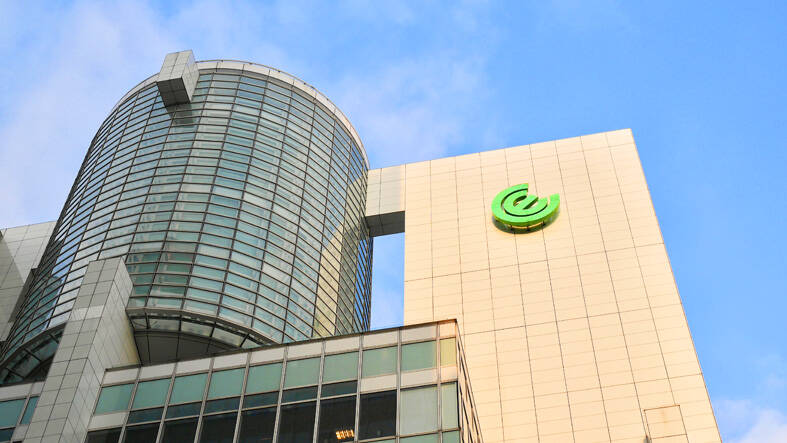Compal Electronics Inc (仁寶), one of the leading contract electronics makers in Taiwan, has announced plans to build a factory in Poland to target automotive electronics clients.
In a statement posted on the Taiwan Stock Exchange, the company yesterday said that it is planning to invest more than NT$500 million (US$15.4 million) to build a factory in Poland, the first time the company is to extend its manufacturing to the European market.
Through its Poland-based subsidiary CGS Technology (Poland) Sp. z o.o., Compal is planning to spend about NT$77.7 million to acquire a parcel of land in Czeladz, Poland, and spend an additional 12.29 million euros (US$13.31 million) to build the plant, bringing the total investment to more than NT$500 million, the company said.

Photo: Fang Wei-chieh, Taipei Times
The company said it is already running an after-sales service center in Poland, and the investment in the European country is aimed at catering to the automotive electronics market.
The investment is part of the company’s efforts to meet regional demand in Europe, it said.
It expects construction of the facility to be completed by the end of the second quarter of next year, with production slated to begin by the end of the year, Compal said.
The new plant is expected to start generating sales in 2026, it added.
Automotive electronics is among Compal’s major businesses, but its products also include handheld devices, wearable gadgets, laptop and desktop computers, Internet of things applications, servers and healthcare equipment.
Compal’s automotive electronics customers are vehicle manufacturers based in Europe, and sales in the business are expected to grow at a double-digit pace this year, market analysts said.
Local news media cited unnamed sources from Compal as saying that the company did not rule out expanding its production in Poland beyond automotive electronics by taking into account customers’ needs.
Compal had focused on Vietnam in terms of overseas investments in the past, but it wants to be closer to its customers in Europe, local media reported.
Capital expenditure to meet overseas investments is expected to range between NT$7 billion and NT$8 billion this year, little changed from last year, they reported.
Compal has intensified its efforts in automotive electronics development, and the company last year started to produce automotive electronics items in a plant in Mexico, which has begun to post sales.

Real estate agent and property developer JSL Construction & Development Co (愛山林) led the average compensation rankings among companies listed on the Taiwan Stock Exchange (TWSE) last year, while contract chipmaker Taiwan Semiconductor Manufacturing Co (TSMC, 台積電) finished 14th. JSL Construction paid its employees total average compensation of NT$4.78 million (US$159,701), down 13.5 percent from a year earlier, but still ahead of the most profitable listed tech giants, including TSMC, TWSE data showed. Last year, the average compensation (which includes salary, overtime, bonuses and allowances) paid by TSMC rose 21.6 percent to reach about NT$3.33 million, lifting its ranking by 10 notches

Popular vape brands such as Geek Bar might get more expensive in the US — if you can find them at all. Shipments of vapes from China to the US ground to a near halt last month from a year ago, official data showed, hit by US President Donald Trump’s tariffs and a crackdown on unauthorized e-cigarettes in the world’s biggest market for smoking alternatives. That includes Geek Bar, a brand of flavored vapes that is not authorized to sell in the US, but which had been widely available due to porous import controls. One retailer, who asked not to be named, because

SEASONAL WEAKNESS: The combined revenue of the top 10 foundries fell 5.4%, but rush orders and China’s subsidies partially offset slowing demand Taiwan Semiconductor Manufacturing Co (TSMC, 台積電) further solidified its dominance in the global wafer foundry business in the first quarter of this year, remaining far ahead of its closest rival, Samsung Electronics Co, TrendForce Corp (集邦科技) said yesterday. TSMC posted US$25.52 billion in sales in the January-to-March period, down 5 percent from the previous quarter, but its market share rose from 67.1 percent the previous quarter to 67.6 percent, TrendForce said in a report. While smartphone-related wafer shipments declined in the first quarter due to seasonal factors, solid demand for artificial intelligence (AI) and high-performance computing (HPC) devices and urgent TV-related orders

MINERAL DIPLOMACY: The Chinese commerce ministry said it approved applications for the export of rare earths in a move that could help ease US-China trade tensions Chinese Vice Premier He Lifeng (何立峰) is today to meet a US delegation for talks in the UK, Beijing announced on Saturday amid a fragile truce in the trade dispute between the two powers. He is to visit the UK from yesterday to Friday at the invitation of the British government, the Chinese Ministry of Foreign Affairs said in a statement. He and US representatives are to cochair the first meeting of the US-China economic and trade consultation mechanism, it said. US President Donald Trump on Friday announced that a new round of trade talks with China would start in London beginning today,